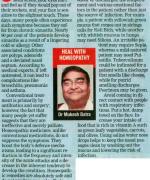Homeopathic medicines boost bodies defence mechanisms
Homeopathic medicines boost bodies defence mechanisms
Just imagine your plight when the center of your skull aches, your eyes hurt and feel as if they would top out of their sockets, and your face is sensitive to the slightest touch. These days, many people often experience such symptoms because they suffer from chronic sinusitis. Nearly 90 per cent of the patients develop sinusitis as a result of a lingering cold or allergy. Other associated conditions are polyps, adenoids and a deviated nasal septum. According to medical experts, if left untreated, it can lead to complications like bronchitis, pneumonia and asthma.
Conventional treatment is primarily by antibiotics and surgery; however, the fact that many people yet suffer suggests that they are ineffective and merely palliate. Homeopathic medicines, unlike conventional medications, do not suppress the symptoms. They boost the body's defence mechanisms, leading to a significant reduction in the frequency and intensity of the acute attacks and a decrease in the inherent tendency to develop the condition. Homeopathic remedies are absolutely safe and do not produce any side-effects.
A recent review of double-blind, randomised clinical studies testing homeopathic medicines, which was published in The Lancet (September 20, 1997), showed that homeopathic medicines were 2.45 times more effective than placebo.
Homeopathy, being holistic, takes into consideration the onset, individual manifestation, type and odour of discharges, the temperament and various emotional factors in the patient rather than just the source of infection. For example, a patient with yellowish green mucus that comes out in strings calls for Kali Bich, while another with whitish mucous in lumps may need Silicea. An irritable patient may require Sepia, whereas a mild-natured patient may need Pulsatilla. Tuberculin could be indicated for a patient with a discharge that smells like cheese, while for putrid smelling discharges Psorinum may be given.
Avoid coming in direct contact with people with respiratory infections. Put a hot, damp towel on the face. In-crease your intake of food that is rich in vitamin A such as green leafy vegetables, carrots, and olives. Using saline water nose drops helps to keep the nasal pas-sages clean by washing out the mucus and lowering the risk of infection.






